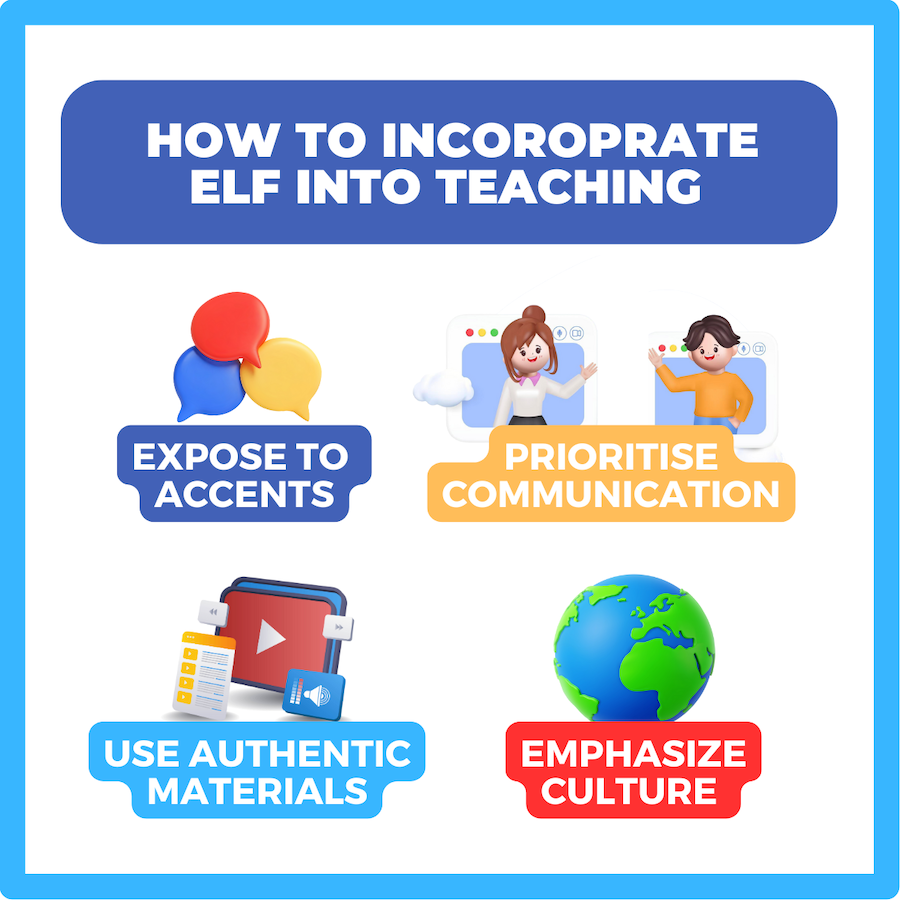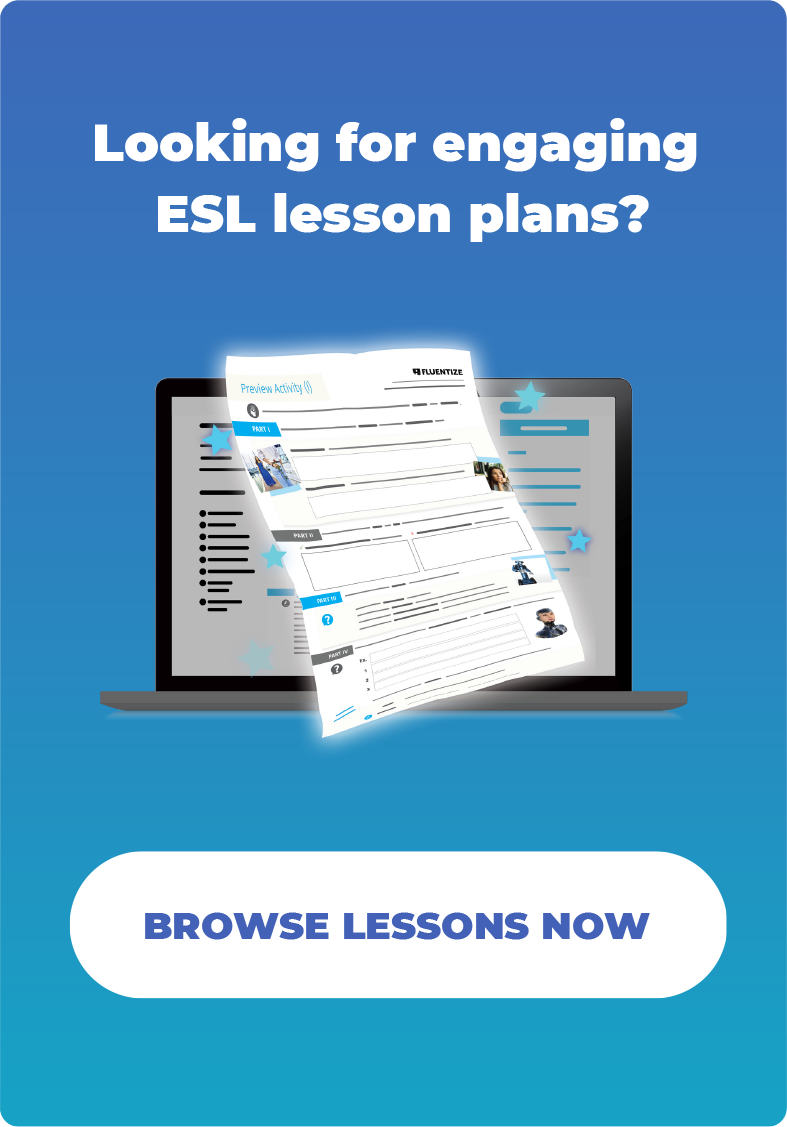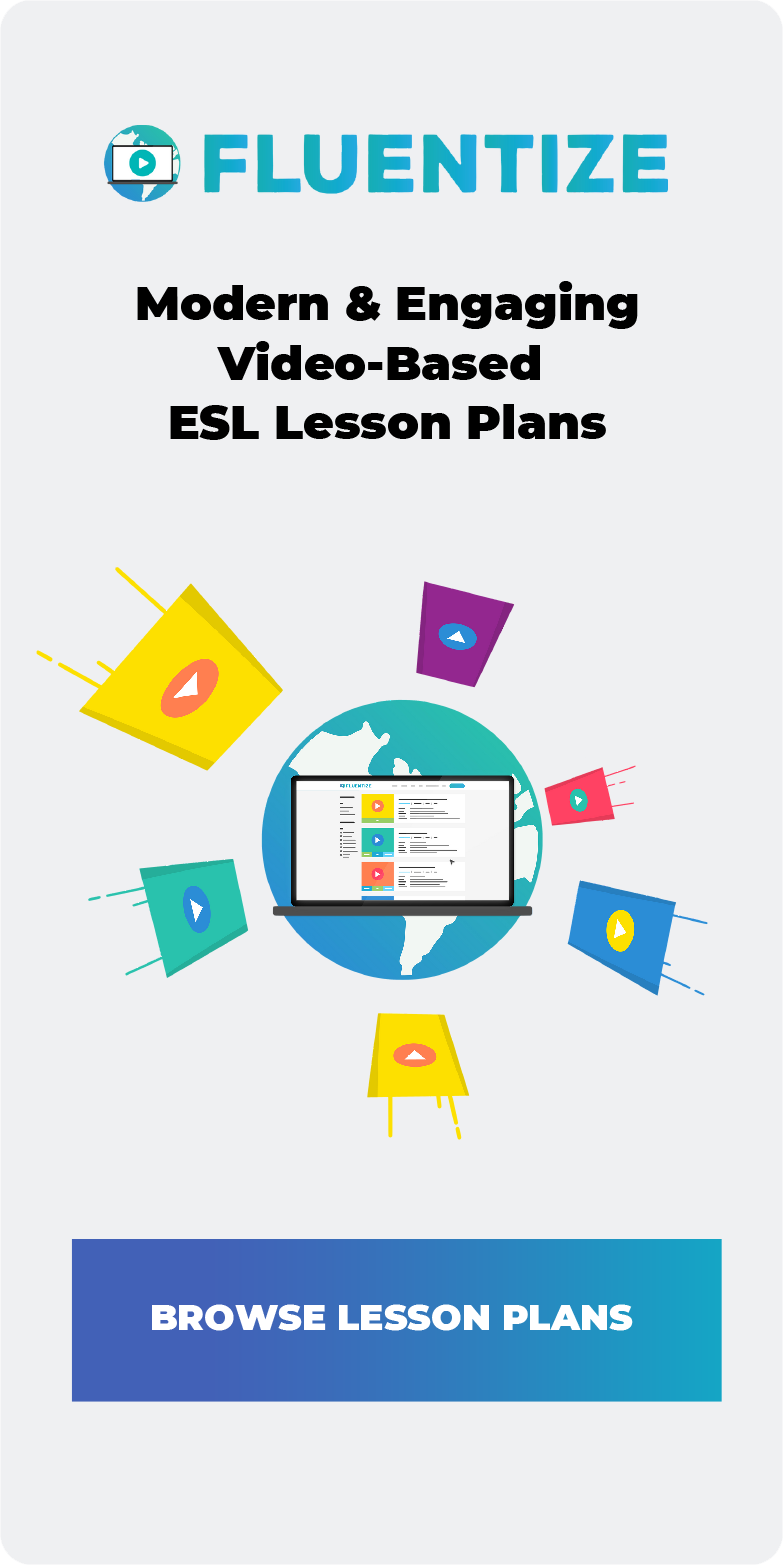Ever notice how English seems to be everywhere? Everywhere you look, English is there. We find it in movies, the internet, music, business, and in many other areas of everyday life. When it comes to communication, English has taken the world by storm. This concept, known as “English as a lingua franca” (ELF), is fascinating and worth exploring.
In this post, we will explore the reasons behind this global trend. We’ll also discuss its implications, and try to help you understand more about English as a lingua franca. We’ll also have an insightful interview with Priscila Bordon, who recently published the book Classroom Practices: English as a Lingua Franca. This was a finalist for the British Council’s ELTons Innovation Awards in 2022.
First, let’s provide a background of English as a global language, or English as a lingua franca.
How did English become a global language?
Today, English is the go-to language for international business, science, technology, and entertainment. English has become the channel for people to communicate from different linguistic and cultural backgrounds. So, how did this all happen?
English didn’t become a global language overnight. Historical, political, and cultural factors all played a part. Remember the British Empire? Their colonial expansion spread English far and wide. Then, the rise of the United States as a global superpower empowered English as a Lingua Franca even further.
However, this widespread use of English isn’t without its problems. For instance, the global dominance of English can often overshadow other languages and cultures. This has led to a loss of linguistic diversity. Additionally, the pressure to learn English can be stressful for non-native speakers. This makes it harder for non-native speakers to compete equally. And let’s not forget the misunderstandings that can arise from varying levels of proficiency.
What does English as a lingua franca mean?

Think of English as a bridge. English as a Lingua Franca (ELF) means people from different countries using English to communicate. Picture a Brazilian chatting with a Japanese person, both using English to understand each other. That’s ELF in action. It’s not about speaking perfect English like a native speaker from the UK or the USA. It’s about communicating your ideas clearly and understanding others, no matter where you’re from.
English as a lingua franca emphasises practical communication skills. Clear and effective communication skills are more important than trying to speak perfectly or sounding like a native-speaker. As a result, it helps people from diverse backgrounds connect more easily.
Why is English is so important for international communication?
Our world is more interconnected than ever. People from different countries need to communicate with each other. Whether it’s in international business meetings, academic conferences, or while traveling, English helps break down language barriers. Plus, this common language makes it easier to share ideas, collaborate, and build international relationships.

Perhaps one of the greatest benefits of learning English is that it allows us to build new relationships with others. We can establish new friendships through English, especially when traveling or through cultural exchange programs.
Additionally, when it comes to global business, companies often use English to negotiate deals, manage projects, and communicate with clients. In science and technology, researchers publish their findings in English to reach a broader audience. Therefore, English is a bridge when networking and creating new professional connections.
This widespread use of English helps to ensure that information and knowledge are accessible to people worldwide. Plus, using a common language can encourage mutual understanding and cooperation among different nations.
What makes English an easy but also challenging language to learn?
Easy aspects
- Simple grammar: First off, English grammar is relatively straightforward. There are no gendered nouns like many other languages have. There are also simpler verb conjugations. This makes it easier to learn compared with many other languages. Plus, the structure of English sentences is generally more flexible. This allows learners to express themselves without getting slowed down by complex grammatical rules.
- Lots of resources: There are so many books, online courses, and apps for learning English. Learners can find materials tailored to every level and learning preference. Also, many communities and forums are available online where learners can practice and get feedback from fluent speakers and other learners.
- Exposure: English is everywhere in media—movies, TV shows, music, social media—giving learners lots of opportunities for practice. This constant exposure helps learners pick up new vocabulary and phrases naturally. Besides that, the availability of subtitles and translations makes it easier for learners to follow along and understand the context.
Challenging aspects:
- Pronunciation: Now, English pronunciation can be tricky. Words often aren’t pronounced the way they’re spelled, and there are many regional accents. For instance, the word “though” doesn’t rhyme with “tough,” and “read” can sound like “reed” or “red” depending on the tense. This inconsistency can be confusing for learners.
- Idioms and slang: English is full of idiomatic expressions and slang that can confuse learners. Phrases like “kick the bucket” or “piece of cake” don’t make literal sense, which can be frustrating. Moreover, slang terms can vary widely between different English-speaking regions. This makes it even more complex.
- Inconsistent rules: English has many exceptions to its rules. This can frustrate learners. For example, the plural of “mouse” is “mice,” but the plural of “house” is “houses.” This means that learners often have to rely on memory for special exceptions, which can slow down the learning process.
Despite these challenges, English provides learners with lots of opportunities to practice and improve their skills. Speaking with proficient speakers, interacting with English media, and participating in language exchange programs can all help learners overcome these difficulties.
Teaching English with a global perspective
So, how can teachers help? Teaching English today isn’t just about grammar and vocabulary. It’s about preparing students to use English in real-world situations where they might communicate with other non-native speakers. This approach is crucial for developing practical language skills.
Here are some ways teachers can incorporate ELF principles into their teaching (Priscila will share more tips below these!)

- Expose students to different accents. To start, you can use videos and audio recordings of people from various countries speaking English. This helps students get used to different accents and understand that English is spoken differently around the world. Also, it can reduce the intimidation factor and make students feel more comfortable with their own accents.
- Focus on communication: You should encourage students to prioritise communicating clearly rather than aiming for perfect English. Teach them strategies for clarifying and checking understanding. This could be paraphrasing or asking for repetition. Plus, role-playing exercises and real-life simulations can help students practice these skills. It’s important to know that building speaking confidence is key to their success.
- Use authentic materials: You can bring real-world materials like news articles, YouTube videos, and social media posts into lessons. These resources show students how English is used in different contexts and expose them to various styles of English. We believe that discussing these materials in class can spark engaging conversations and deepen students’ understanding of the language. To support your use of authentic materials, you can use lesson plans that were developed by other teachers or professional writers. Check out Fluentize — a resource filled with professionally written, video-based lesson plans from beginner to advanced levels.
- Explore cultural contexts: Last but not least, teach students about the cultural backgrounds of English speakers from different countries. Understanding cultural nuances can improve communication. By incorporating cultural studies into lessons, you can make learning more interesting and relevant.
By adopting these practices, teachers can help ESL students become more effective global communicators. Plus, this approach improves language skills and builds confidence when using English. ESL students who are comfortable with English as a lingua franca are better prepared to engage with the world around them, both personally and professionally.
Interview with Priscila Bordon: English as a Lingua Franca

And now, let’s move on to our interview with Priscila Bordon. She will share her insights on ELF and discuss her latest book, Classroom Practices: English as a Lingua Franca.
Priscila’s work has been recognised for its innovative approach. She’s here to provide valuable tips for teachers and learners alike. If you’re looking to gain a fresh perspective about the value of teaching English as a lingua franca, then we encourage you to read our interview with her and let us know your thoughts.
We’d love to hear your perspective as well!
1. Can you start by explaining what English as a Lingua Franca (ELF) means? How is it different from traditional English teaching?
English as a Lingua Franca is a way of looking at English spoken globally. It is the use of English by, mostly but not exclusively, non-native speakers.
2. Why do you think teaching English as a Lingua Franca is important in today’s globalised world?
Because we are teaching more than the structure of a language, we, as English teachers, have the responsibility of teaching a language that can both empower and dispower. Bringing awareness to our learners that English is plural and that it belongs to anyone who uses will empower them.
3. What inspired you to write your book, “CLASSROOM PRACTICES – ENGLISH AS A LINGUA FRANCA”? Can you share a key takeaway from it?
I believe that my main inspiration for writing the book was to make ELF more accessible to teachers who might benefit from the idea of ELF as an empowerment tool for their learners. The main takeaway is that it is possible to implement a more ELF aware practice in any context if the teacher is aware of what ELF is.
4. How can novice ESL teachers begin to incorporate ELF principles into their lessons?
The first step would be understanding what ELF is or is not. Many people believe English as a lingua franca is a variety of English, which is far from the truth. ELF, as I mentioned, is a lens from which we look the English spoken throughout the world. From this understanding, teachers could start exposing learners to non-native speakers of English. Authentic materials from Youtube channels are a great way to find non-native speakers.
5. What are some practical classroom activities that promote English as a Lingua Franca?
Teaching communication strategies the same way we teach grammar and vocabulary is a good way to make ELF more present in the classroom since ELF communication relies heavily in good use of communication strategies such as paraphrasing and asking for repetition.
6. Can you share an example of a common misconception about ELF and how teachers can address it?
There are many misconceptions but the one that we can always hear around the ELT world is that teaching ELF is teaching ‘poor’ or ‘basic’ English and just accept anything because it is intelligible. This is not only a lie but also very far from ELF theory. Being intelligible is not only about being understood, but also communicating with the least noise in between communicators as possible. Teachers have the role to help students decrease this communication noise and be more and more intelligible, and that means teaching grammar rules, for example. As teachers, we do need to acknowledge and teach standard English, we just can’t enforce the ideology that comes with it.
7. What changes in teacher behaviour do you believe are essential when teaching ELF?
Beliefs and attitudes are built into a teacher’s mindset early on in their careers, even before it. As students we start observing our teachers and making our assumptions of what a good teacher is. Creating an ELF aware mindset is no easy task when we are drowed in ideologies such as Standard English Ideology and Nativerspeakerism. I believe committing to an ELF aware teaching practice brings changes to teachers, not the other way around. Changing comes to learning about ELF.
8. How can teachers create lesson plans that focus on communication and understanding instead of perfect grammar?
One strategy that might prove effective is including in your planning a new component called ELF Component. This means that in every class you commit to including something that can, at least, expose your learners to ELF communication.
9. What are some good ways to teach pronunciation in an ELF classroom, considering students will hear many different accents?
After exposing learners to different Englishes, exploring the pron in each video or audio is an opportunity to validating your students pronunciation as well as tackle pronunciation features that might still be problematic in your classroom. Teaching pron from an ELF perspective is very contextual to each classroom and each teacher can which pronunciation features should be investigated and practiced in class.
10. How can teachers help students feel proud of their own way of speaking English while learning ELF?
Firstly, validating their students’ English as a way of using English. Learners are first and foremost users of the language. They can grow from the point they are in confidence, fluence and accuracy with a teacher’s help, but they are already ELF communicators, and this should be of their knowledge.
11. How can teachers create a more inclusive environment for learners of different linguistic and cultural backgrounds?
Creating an ELF aware environment by also bringing the idea of ELF so their students know that whatever their teacher is doing in class is part of a well-studied field of research.
12. In your experience, what impact does teaching English as a lingua franca have on students’ confidence and communication skills?
Teaching an ELF-aware class has benefits in students confidence because they can see themselves as enough. Teachers, and even students themselves, believe students are only learners of the language. But anyone is only a learner in a classroom. When learners are in a business meeting or travelling, they are not learners, they are users of English. Teachers should make their students aware that learners are English users so they can see they are enough.
13. Finally, what advice would you give to experienced ESL teachers who are looking to transition from traditional methods to ELF-based teaching?
Get to know more about ELF and how you can start looking at English through these new lenses. Trying to expose learners to new models of English, exploring new varieties or even using your students as models of the language will bring benefits to your students’ confidence and even to your own view of self. My tip is start moving towards it and you will notice the difference.
Leveraging English as a lingua franca to create more inclusive, globally-minded classrooms
Adopting a more global perspective in the classroom starts with bringing the world into lessons. Integrating discussions about global issues and current events can naturally lead to richer, more engaging conversations. Using authentic resources, like news articles, podcasts, and literature, makes these topics come alive and helps students relate to what they’re learning.
Encouraging students to share their cultural perspectives is also key—not just focusing on the language, but on how it connects people across different backgrounds. This approach transforms English into a tool for real-world communication and understanding.
It’s also worth encouraging students to explore opportunities beyond the classroom. Language meetups, cultural events, and casual exchanges outside a strict educational context can help students build genuine, meaningful connections. These experiences can bring English to life and show how English functions as a true lingua franca.









